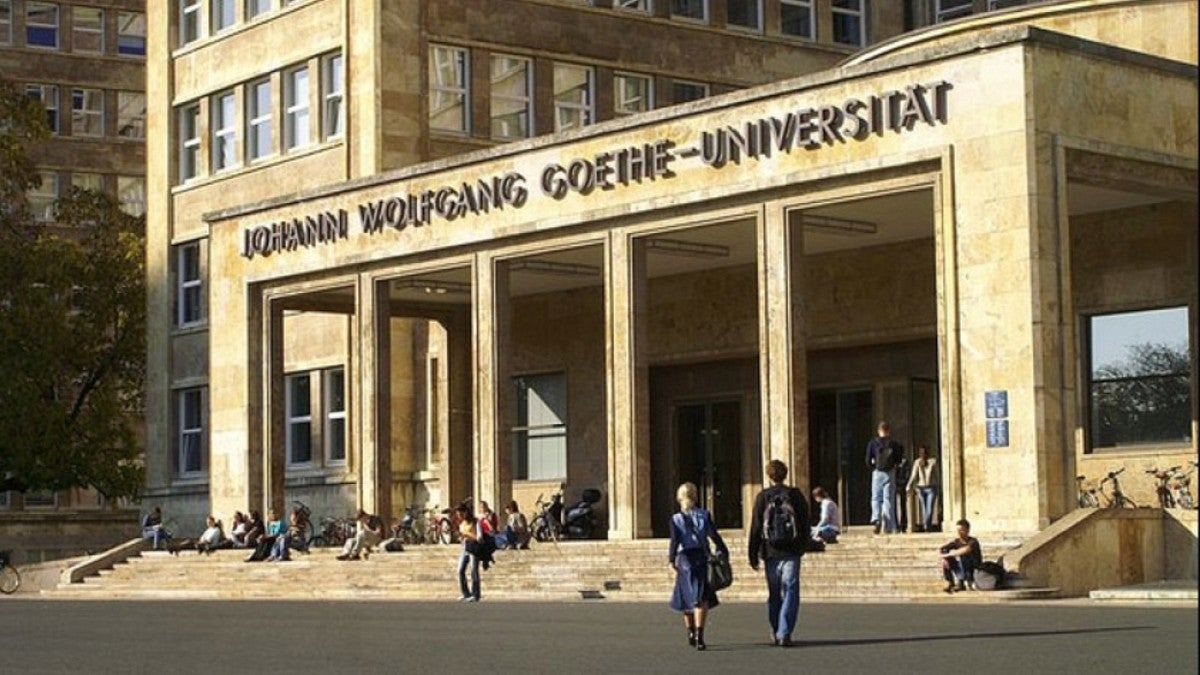Two University of Oregon students, one an undergraduate and the other a recent recipient of a doctoral degree, have received international scholarships to pursue research projects in Germany.
The funding will enable UO undergraduate Alex Mentzel to delve further into a study of theater arts and doctoral graduate Rebecca Calcott to expand her psychology research at German institutions during the coming academic year.
The German Academic Exchange Service, known by its German acronym DAAD, awards the competitive, merit-based grants to students from around the world so recipients can enrich their studies or research projects through time abroad.
Mentzel, a Clark Honors College student nearing completion of his undergraduate career with degrees in German and theater arts, will combine his two academic interests at the Institute for Theater, Film, and Media Studies at Goethe University Frankfurt. He plans to take classes through the university’s master’s program and the nearby Frankfurt University of Music and Performing Arts. The curriculum will integrate academics and performance through an interdisciplinary approach to theater studies and practice.
Mentzel will also work directly with program director and professor Nikolaus Müller-Schöll on his thesis project, which involves translating and adapting Franz Kafka’s novella “The Trial” into a modernized story that addresses contemporary sociopolitical issues like immigration and undocumented immigrants.
“One of the reasons I am so interested in theater is because I can use it to amplify a diverse group of voices and help tell stories that emerge from underrepresented communities,” Mentzel said.
Mentzel aims to incorporate staging techniques inspired by German director, playwright and academic Bertolt Brecht, who was known for evolving theater into a social and ideological forum. He will be working with instructors who specialize in this style and interning as an assistant director for Jan Phillip-Stange’s new production of Brecht’s “The Downfall of the Egotist Johann Fatzer.”
“It’s nearly impossible to get hands-on work in Brecht in the United States,” Mentzel explained. “This is an incredible opportunity for me because I’m interested in incorporating his techniques into my thesis project.”
According to Mentzel, Germany offers an ideal location to study theater because the country invests more state support into the arts than the United States does. Because of this, theater tends to be more prevalent and more varied in Europe.
“When performances don’t have to rely primarily on box office sales to generate revenue, there is more experimentation because it’s a safer environment,” he explained.
Calcott is headed to the University of Regensburg to build on research she conducted while completing her doctoral degree in psychology at the UO. While in Eugene, Calcott worked with UO psychologist Elliot Berkman to examine cognitive control and the mental processes that facilitate goal-oriented thoughts and behaviors.
“Cognitive control allows us to stay focused on our goals and avoid distraction,” Calcott explained. “For example, it helps us ignore notifications from social media while studying, while also allowing us to switch our focus if the situation requires — like if the fire alarm goes off and you need to stop studying.
“I looked into our ability to avoid distractions and flexibly shift our attention through looking at neurotransmitters in the brain.”
Calcott’s project in Germany will build on his research by examining how the opportunity to earn rewards influences this cognitive control. She will look at instances where humans become better at ignoring distractions in situations where distractions can be more detrimental to performance.
She will conduct her research in the lab of Gesine Dreisbach, who specializes in adaptive cognitive control and performance-contingent rewards.
“I’m very excited to be incorporating rewards into my research,” Calcott said. “A lot of recent work on cognitive control suggests that our ability to control our thoughts and behaviors depends in large part on our motivation to do so, which means that the reward aspect is critical to understanding cognitive control and goal pursuit in general.”
Calcott explains that this scholarship presented an ideal opportunity to expand her research. The funds will enable her to work in the lab of a psychologist who specializes in the research she is interested in pursuing and is an expert at designing and conducting experiments that are relevant to her work.
“I am very excited about the opportunity to work in this lab and connect with researchers in Germany,” Calcott said. “I am also thrilled about the chance to live abroad and experience a different culture and language.”
—By Emily Halnon, University Communications


